The Day the Revolution Began - Session 2
Chris Knepp
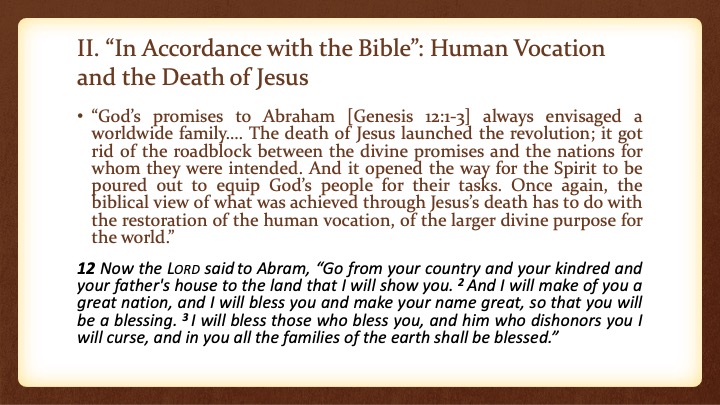
II. “In Accordance with the Bible”: Human Vocation and the Death of Jesus
“God’s promises to Abraham [Genesis 12:1-3] always envisaged a worldwide family…. The death of Jesus launched the revolution; it got rid of the roadblock between the divine promises and the nations for whom they were intended. And it opened the way for the Spirit to be poured out to equip God’s people for their tasks. Once again, the biblical view of what was achieved through Jesus’s death has to do with the restoration of the human vocation, of the larger divine purpose for the world.”
12 Now the Lord said to Abram, “Go from your country and your kindred and your father's house to the land that I will show you. 2 And I will make of you a great nation, and I will bless you and make your name great, so that you will be a blessing. 3 I will bless those who bless you, and him who dishonors you I will curse, and in you all the families of the earth shall be blessed.”
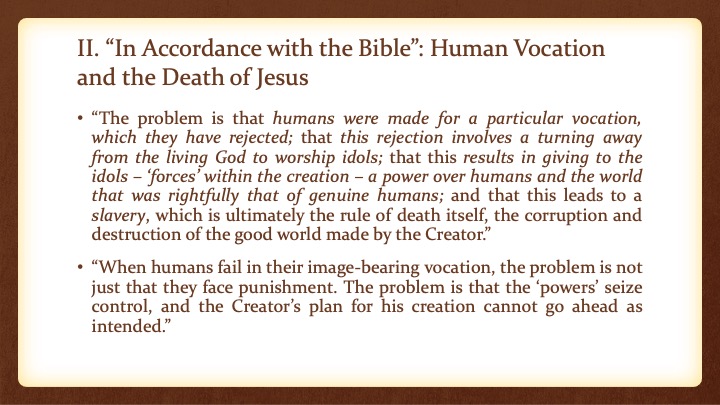
II. “In Accordance with the Bible”: Human Vocation and the Death of Jesus
“The problem is that humans were made for a particular vocation, which they have rejected; that this rejection involves a turning away from the living God to worship idols; that this results in giving to the idols – ‘forces’ within the creation – a power over humans and the world that was rightfully that of genuine humans; and that this leads to a slavery, which is ultimately the rule of death itself, the corruption and destruction of the good world made by the Creator.”
“When humans fail in their image-bearing vocation, the problem is not just that they face punishment. The problem is that the ‘powers’ seize control, and the Creator’s plan for his creation cannot go ahead as intended.”
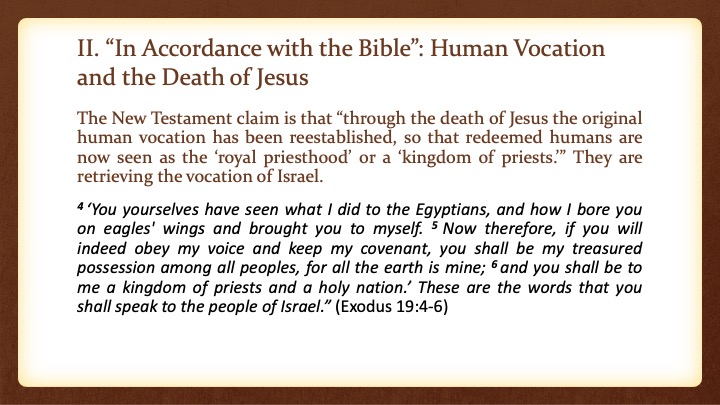
II. “In Accordance with the Bible”: Human Vocation and the Death of Jesus
The New Testament claim is that “through the death of Jesus the original human vocation has been reestablished, so that redeemed humans are now seen as the ‘royal priesthood’ or a ‘kingdom of priests.’” They are retrieving the vocation of Israel.
4 ‘You yourselves have seen what I did to the Egyptians, and how I bore you on eagles' wings and brought you to myself. 5 Now therefore, if you will indeed obey my voice and keep my covenant, you shall be my treasured possession among all peoples, for all the earth is mine; 6 and you shall be to me a kingdom of priests and a holy nation.’ These are the words that you shall speak to the people of Israel.” (Exodus 19:4-6)
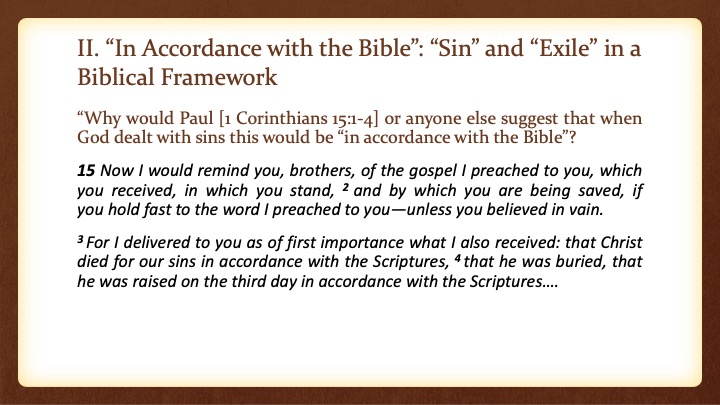
II. “In Accordance with the Bible”: “Sin” and “Exile” in a Biblical Framework
“Why would Paul [1 Corinthians 15:1-4] or anyone else suggest that when God dealt with sins this would be “in accordance with the Bible”?
15 Now I would remind you, brothers, of the gospel I preached to you, which you received, in which you stand, 2 and by which you are being saved, if you hold fast to the word I preached to you—unless you believed in vain.
3 For I delivered to you as of first importance what I also received: that Christ died for our sins in accordance with the Scriptures, 4 that he was buried, that he was raised on the third day in accordance with the Scriptures….
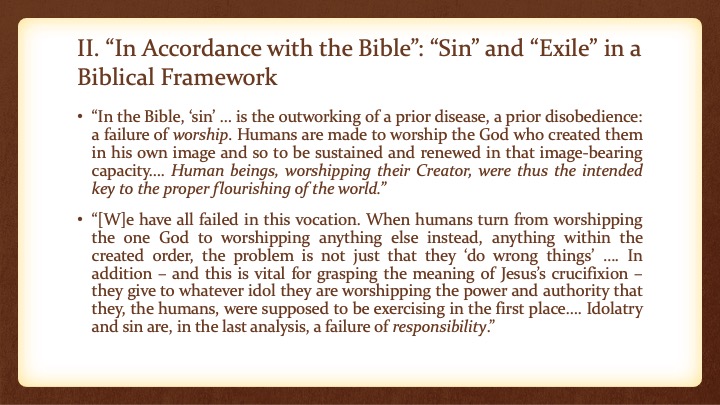
II. “In Accordance with the Bible”: “Sin” and “Exile” in a Biblical Framework
“In the Bible, ‘sin’ … is the outworking of a prior disease, a prior disobedience: a failure of worship. Humans are made to worship the God who created them in his own image and so to be sustained and renewed in that image-bearing capacity…. Human beings, worshipping their Creator, were thus the intended key to the proper flourishing of the world.”
“[W]e have all failed in this vocation. When humans turn from worshipping the one God to worshipping anything else instead, anything within the created order, the problem is not just that they ‘do wrong things’ …. In addition – and this is vital for grasping the meaning of Jesus’s crucifixion – they give to whatever idol they are worshipping the power and authority that they, the humans, were supposed to be exercising in the first place…. Idolatry and sin are, in the last analysis, a failure of responsibility.”
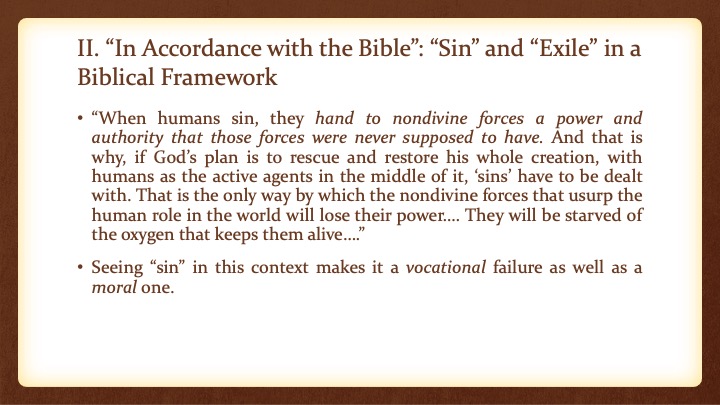
II. “In Accordance with the Bible”: “Sin” and “Exile” in a Biblical Framework
“When humans sin, they hand to nondivine forces a power and authority that those forces were never supposed to have. And that is why, if God’s plan is to rescue and restore his whole creation, with humans as the active agents in the middle of it, ‘sins’ have to be dealt with. That is the only way by which the nondivine forces that usurp the human role in the world will lose their power…. They will be starved of the oxygen that keeps them alive….”
Seeing “sin” in this context makes it a vocational failure as well as a moral one.
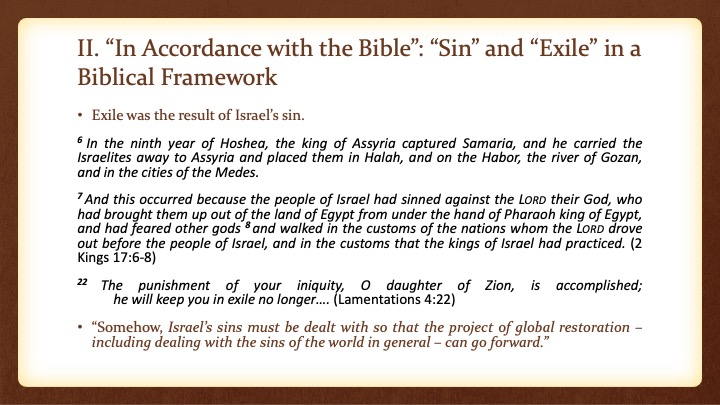
II. “In Accordance with the Bible”: “Sin” and “Exile” in a Biblical Framework
Exile was the result of Israel’s sin.
6 In the ninth year of Hoshea, the king of Assyria captured Samaria, and he carried the Israelites away to Assyria and placed them in Halah, and on the Habor, the river of Gozan, and in the cities of the Medes.
7 And this occurred because the people of Israel had sinned against the Lord their God, who had brought them up out of the land of Egypt from under the hand of Pharaoh king of Egypt, and had feared other gods 8 and walked in the customs of the nations whom the Lord drove out before the people of Israel, and in the customs that the kings of Israel had practiced. (2 Kings 17:6-8)
22 The
punishment of your iniquity, O daughter of Zion, is accomplished;
he
will keep you in exile no longer…. (Lamentations 4:22)
“Somehow, Israel’s sins must be dealt with so that the project of global restoration – including dealing with the sins of the world in general – can go forward.”
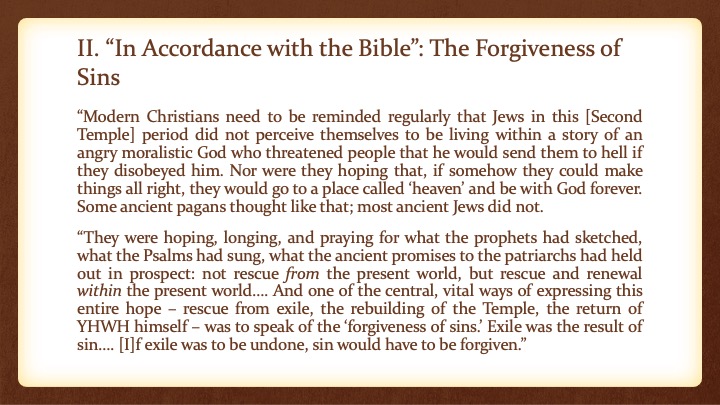
II. “In Accordance with the Bible”: The Forgiveness of Sins
“Modern Christians need to be reminded regularly that Jews in this [Second Temple] period did not perceive themselves to be living within a story of an angry moralistic God who threatened people that he would send them to hell if they disobeyed him. Nor were they hoping that, if somehow they could make things all right, they would go to a place called ‘heaven’ and be with God forever. Some ancient pagans thought like that; most ancient Jews did not.
“They were hoping, longing, and praying for what the prophets had sketched, what the Psalms had sung, what the ancient promises to the patriarchs had held out in prospect: not rescue from the present world, but rescue and renewal within the present world…. And one of the central, vital ways of expressing this entire hope – rescue from exile, the rebuilding of the Temple, the return of YHWH himself – was to speak of the ‘forgiveness of sins.’ Exile was the result of sin…. [I]f exile was to be undone, sin would have to be forgiven.”
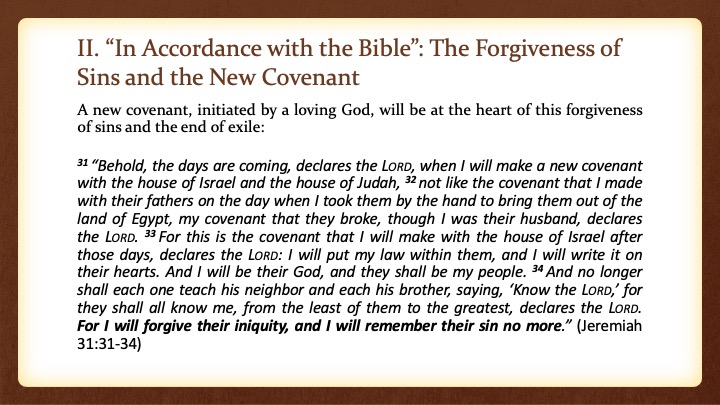
II. “In Accordance with the Bible”: The Forgiveness of Sins and the New Covenant
A new covenant, initiated by a loving God, will be at the heart of this forgiveness of sins and the end of exile:
31 “Behold, the days are coming, declares the Lord, when I will make a new covenant with the house of Israel and the house of Judah, 32 not like the covenant that I made with their fathers on the day when I took them by the hand to bring them out of the land of Egypt, my covenant that they broke, though I was their husband, declares the Lord. 33 For this is the covenant that I will make with the house of Israel after those days, declares the Lord: I will put my law within them, and I will write it on their hearts. And I will be their God, and they shall be my people. 34 And no longer shall each one teach his neighbor and each his brother, saying, ‘Know the Lord,’ for they shall all know me, from the least of them to the greatest, declares the Lord. For I will forgive their iniquity, and I will remember their sin no more.” (Jeremiah 31:31-34)
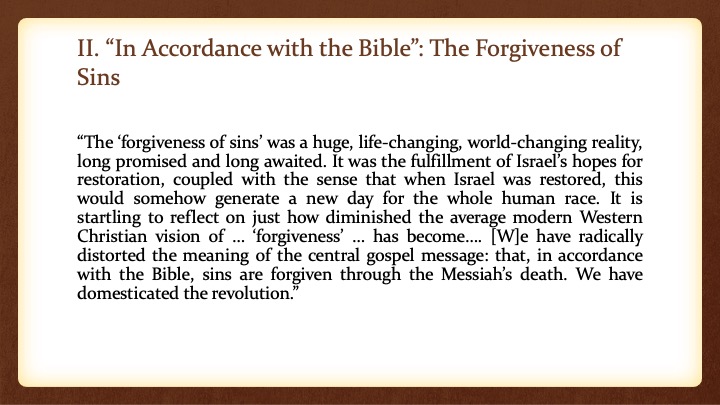
II. “In Accordance with the Bible”: The Forgiveness of Sins
“The ‘forgiveness of sins’ was a huge, life-changing, world-changing reality, long promised and long awaited. It was the fulfillment of Israel’s hopes for restoration, coupled with the sense that when Israel was restored, this would somehow generate a new day for the whole human race. It is startling to reflect on just how diminished the average modern Western Christian vision of … ‘forgiveness’ … has become…. [W]e have radically distorted the meaning of the central gospel message: that, in accordance with the Bible, sins are forgiven through the Messiah’s death. We have domesticated the revolution.”
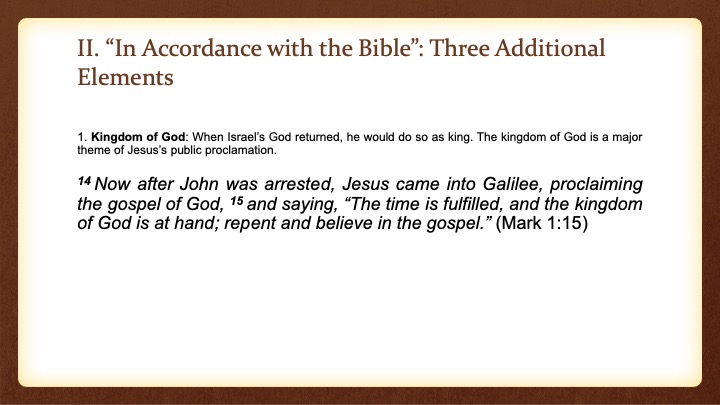
II. “In Accordance with the Bible”: Three Additional Elements
1. Kingdom of God: When Israel’s God returned, he would do so as king. The kingdom of God is a major theme of Jesus’s public proclamation.
14 Now after John was arrested, Jesus came into Galilee, proclaiming the gospel of God, 15 and saying, “The time is fulfilled, and the kingdom of God is at hand; repent and believe in the gospel.” (Mark 1:15)
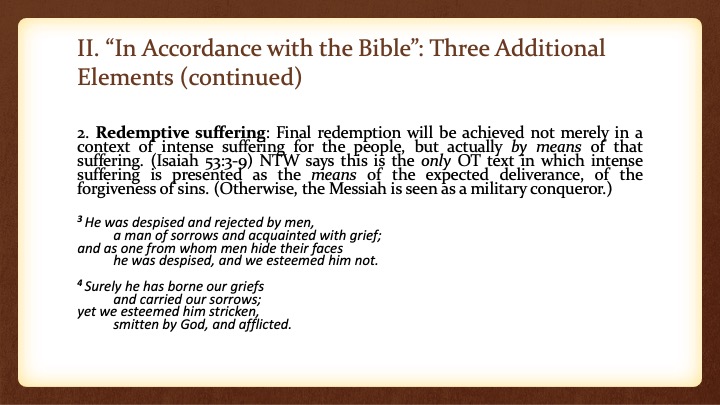
II. “In Accordance with the Bible”: Three Additional Elements (continued)
2. Redemptive suffering: Final redemption will be achieved not merely in a context of intense suffering for the people, but actually by means of that suffering. (Isaiah 53:3-9) NTW says this is the only OT text in which intense suffering is presented as the means of the expected deliverance, of the forgiveness of sins. (Otherwise, the Messiah is seen as a military conqueror.)
3 He was despised and
rejected by men,
a man of sorrows and acquainted
with grief;
and as one from whom men hide their faces
he was despised, and we esteemed him not.
4 Surely he has borne our
griefs
and carried our sorrows;
yet we esteemed him stricken,
smitten by God, and
afflicted.
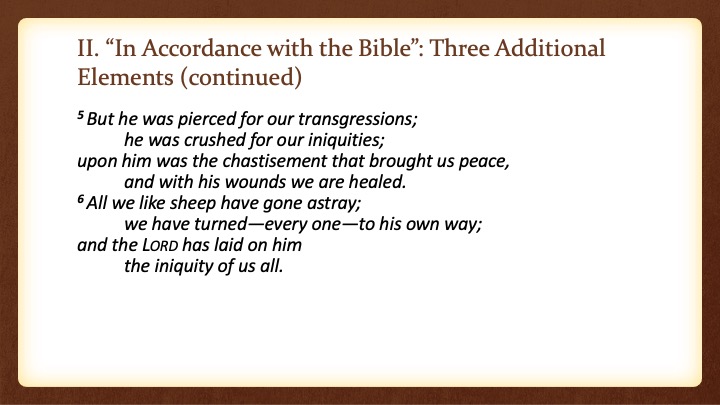
II. “In Accordance with the Bible”: Three Additional Elements (continued)
5 But
he was pierced for our transgressions;
he
was crushed for our iniquities;
upon him was the chastisement that brought us peace,
and
with his wounds we are healed.
6 All
we like sheep have gone astray;
we
have turned—every one—to
his own way;
and the Lord has
laid on him
the
iniquity of us all.
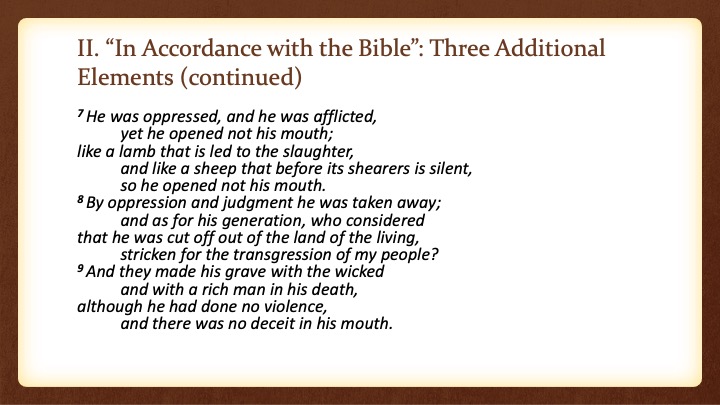
II. “In Accordance with the Bible”: Three Additional Elements (continued)
7 He
was oppressed, and he was afflicted,
yet
he opened not his mouth;
like a lamb that is led to the slaughter,
and
like a sheep that before its shearers is silent,
so
he opened not his mouth.
8 By
oppression and judgment he was taken away;
and
as for his generation, who considered
that he was cut off out of the land of the living,
stricken
for the transgression of my people?
9 And
they made his grave with the wicked
and
with a rich man in his death,
although he had done no violence,
and
there was no deceit in his mouth.
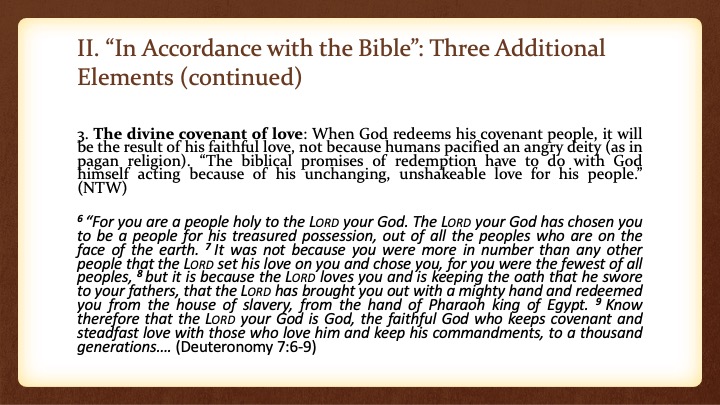
II. “In Accordance with the Bible”: Three Additional Elements (continued)
3. The divine covenant of love: When God redeems his covenant people, it will be the result of his faithful love, not because humans pacified an angry deity (as in pagan religion). “The biblical promises of redemption have to do with God himself acting because of his unchanging, unshakeable love for his people.” (NTW)
6 “For you are a people holy to the Lord your God. The Lord your God has chosen you to be a people for his treasured possession, out of all the peoples who are on the face of the earth. 7 It was not because you were more in number than any other people that the Lord set his love on you and chose you, for you were the fewest of all peoples, 8 but it is because the Lord loves you and is keeping the oath that he swore to your fathers, that the Lord has brought you out with a mighty hand and redeemed you from the house of slavery, from the hand of Pharaoh king of Egypt. 9 Know therefore that the Lord your God is God, the faithful God who keeps covenant and steadfast love with those who love him and keep his commandments, to a thousand generations…. (Deuteronomy 7:6-9)
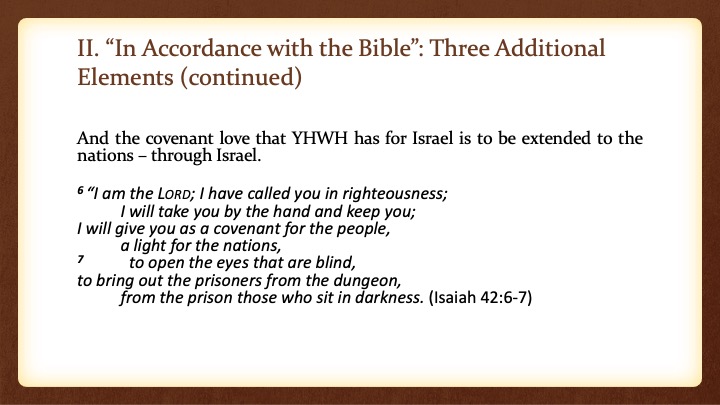
II. “In Accordance with the Bible”: Three Additional Elements (continued)
And the covenant love that YHWH has for Israel is to be extended to the nations – through Israel.
6 “I am
the Lord; I
have called you in righteousness;
I
will take you by the hand and keep you;
I will give you as a covenant for the people,
a
light for the nations,
7 to
open the eyes that are blind,
to bring out the prisoners from the dungeon,
from
the prison those who sit in darkness. (Isaiah
42:6-7)
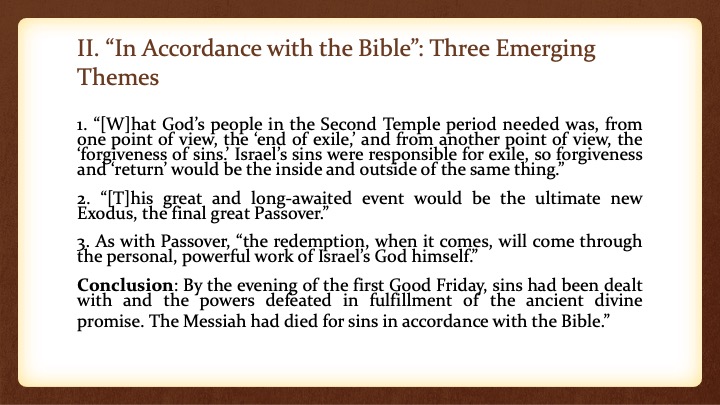
II. “In Accordance with the Bible”: Three Emerging Themes
1. “[W]hat God’s people in the Second Temple period needed was, from one point of view, the ‘end of exile,’ and from another point of view, the ‘forgiveness of sins.’ Israel’s sins were responsible for exile, so forgiveness and ‘return’ would be the inside and outside of the same thing.”
2. “[T]his great and long-awaited event would be the ultimate new Exodus, the final great Passover.”
3. As with Passover, “the redemption, when it comes, will come through the personal, powerful work of Israel’s God himself.”
Conclusion: By the evening of the first Good Friday, sins had been dealt with and the powers defeated in fulfillment of the ancient divine promise. The Messiah had died for sins in accordance with the Bible.”
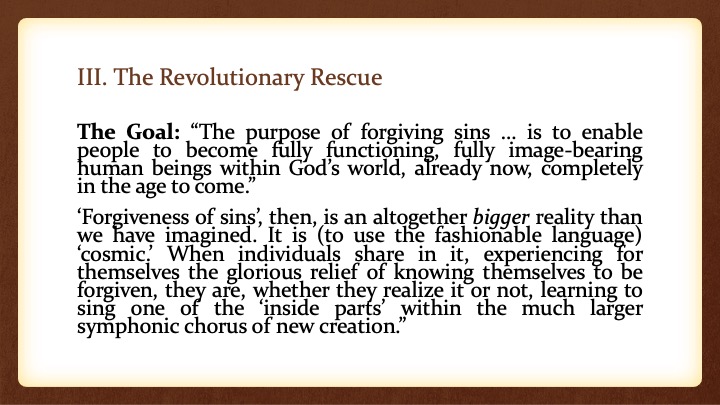
III. The Revolutionary Rescue
The Goal: “The purpose of forgiving sins … is to enable people to become fully functioning, fully image-bearing human beings within God’s world, already now, completely in the age to come.”
‘Forgiveness of sins’, then, is an altogether bigger reality than we have imagined. It is (to use the fashionable language) ‘cosmic.’ When individuals share in it, experiencing for themselves the glorious relief of knowing themselves to be forgiven, they are, whether they realize it or not, learning to sing one of the ‘inside parts’ within the much larger symphonic chorus of new creation.”
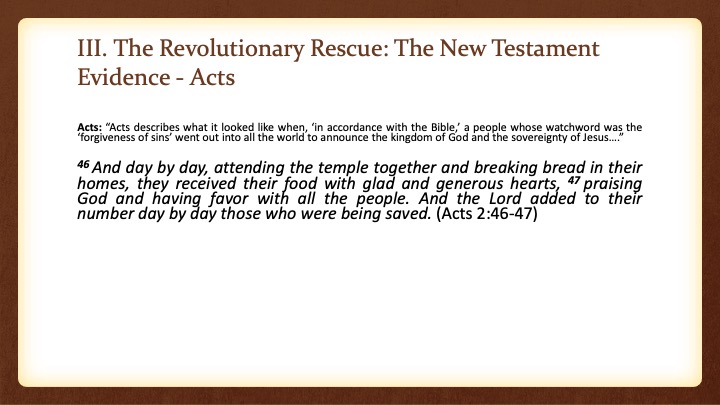
III. The Revolutionary Rescue: The New Testament Evidence - Acts
Acts: “Acts describes what it looked like when, ‘in accordance with the Bible,’ a people whose watchword was the ‘forgiveness of sins’ went out into all the world to announce the kingdom of God and the sovereignty of Jesus….”
46 And day by day, attending the temple together and breaking bread in their homes, they received their food with glad and generous hearts, 47 praising God and having favor with all the people. And the Lord added to their number day by day those who were being saved. (Acts 2:46-47)
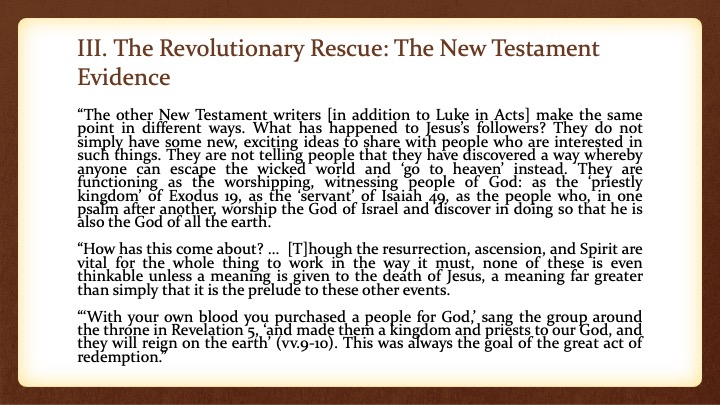
III. The Revolutionary Rescue: The New Testament Evidence
“The other New Testament writers [in addition to Luke in Acts] make the same point in different ways. What has happened to Jesus’s followers? They do not simply have some new, exciting ideas to share with people who are interested in such things. They are not telling people that they have discovered a way whereby anyone can escape the wicked world and ‘go to heaven’ instead. They are functioning as the worshipping, witnessing people of God: as the ‘priestly kingdom’ of Exodus 19, as the ‘servant’ of Isaiah 49, as the people who, in one psalm after another, worship the God of Israel and discover in doing so that he is also the God of all the earth.
“How has this come about? … [T]hough the resurrection, ascension, and Spirit are vital for the whole thing to work in the way it must, none of these is even thinkable unless a meaning is given to the death of Jesus, a meaning far greater than simply that it is the prelude to these other events.
“‘With your own blood you purchased a people for God,’ sang the group around the throne in Revelation 5, ‘and made them a kingdom and priests to our God, and they will reign on the earth’ (vv.9-10). This was always the goal of the great act of redemption.”
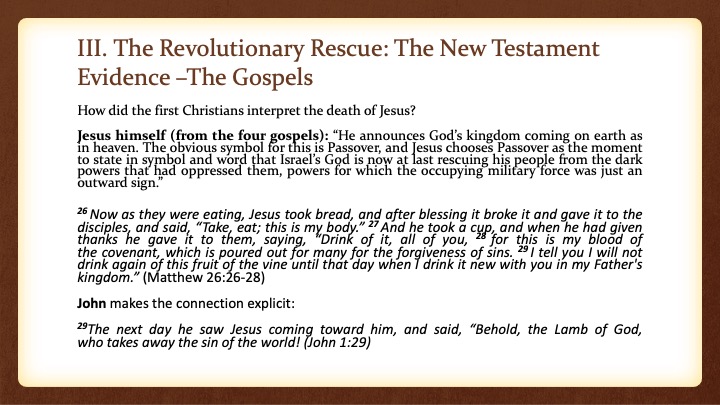
III. The Revolutionary Rescue: The New Testament Evidence –The Gospels
How did the first Christians interpret the death of Jesus?
Jesus himself (from the four gospels): “He announces God’s kingdom coming on earth as in heaven. The obvious symbol for this is Passover, and Jesus chooses Passover as the moment to state in symbol and word that Israel’s God is now at last rescuing his people from the dark powers that had oppressed them, powers for which the occupying military force was just an outward sign.”
26 Now as they were eating, Jesus took bread, and after blessing it broke it and gave it to the disciples, and said, “Take, eat; this is my body.” 27 And he took a cup, and when he had given thanks he gave it to them, saying, “Drink of it, all of you, 28 for this is my blood of the covenant, which is poured out for many for the forgiveness of sins. 29 I tell you I will not drink again of this fruit of the vine until that day when I drink it new with you in my Father's kingdom.” (Matthew 26:26-28)
John makes the connection explicit:
29The next day he saw Jesus coming toward him, and said, “Behold, the Lamb of God, who takes away the sin of the world! (John 1:29)
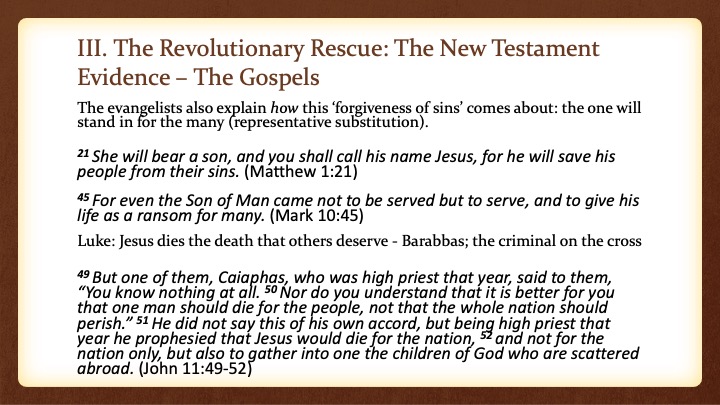
III. The Revolutionary Rescue: The New Testament Evidence – The Gospels
The evangelists also explain how this ‘forgiveness of sins’ comes about: the one will stand in for the many (representative substitution).
21 She will bear a son, and you shall call his name Jesus, for he will save his people from their sins. (Matthew 1:21)
45 For even the Son of Man came not to be served but to serve, and to give his life as a ransom for many. (Mark 10:45)
Luke: Jesus dies the death that others deserve - Barabbas; the criminal on the cross
49 But one of them, Caiaphas, who was high priest that year, said to them, “You know nothing at all. 50 Nor do you understand that it is better for you that one man should die for the people, not that the whole nation should perish.” 51 He did not say this of his own accord, but being high priest that year he prophesied that Jesus would die for the nation, 52 and not for the nation only, but also to gather into one the children of God who are scattered abroad. (John 11:49-52)
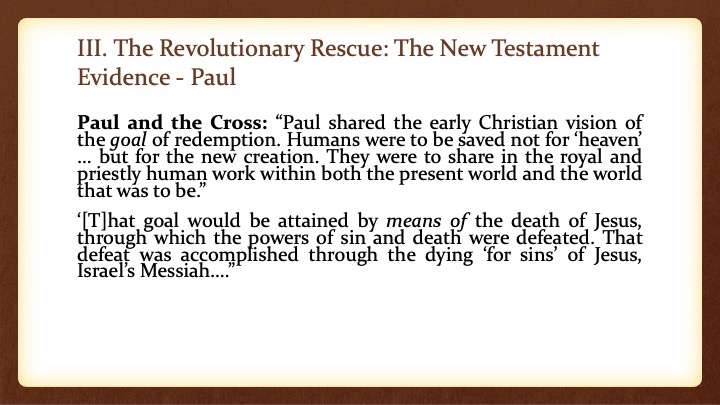
III. The Revolutionary Rescue: The New Testament Evidence – Paul
Paul and the Cross: “Paul shared the early Christian vision of the goal of redemption. Humans were to be saved not for ‘heaven’ … but for the new creation. They were to share in the royal and priestly human work within both the present world and the world that was to be.”
‘[T]hat
goal would be attained by means of the
death of Jesus, through which the powers of sin and death were defeated. That
defeat was accomplished through the dying ‘for sins’ of Jesus, Israel’s
Messiah….”
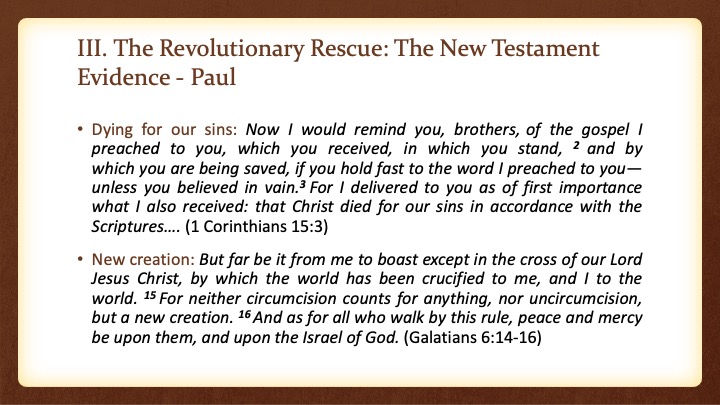
III. The Revolutionary Rescue: The New Testament Evidence – Paul
Dying for our sins: Now I would remind you, brothers, of the gospel I preached to you, which you received, in which you stand, 2 and by which you are being saved, if you hold fast to the word I preached to you—unless you believed in vain.3 For I delivered to you as of first importance what I also received: that Christ died for our sins in accordance with the Scriptures…. (1 Corinthians 15:3)
New creation: But far be it from me to boast except in the cross of our Lord Jesus Christ, by which the world has been crucified to me, and I to the world. 15 For neither circumcision counts for anything, nor uncircumcision, but a new creation. 16 And as for all who walk by this rule, peace and mercy be upon them, and upon the Israel of God. (Galatians 6:14-16)
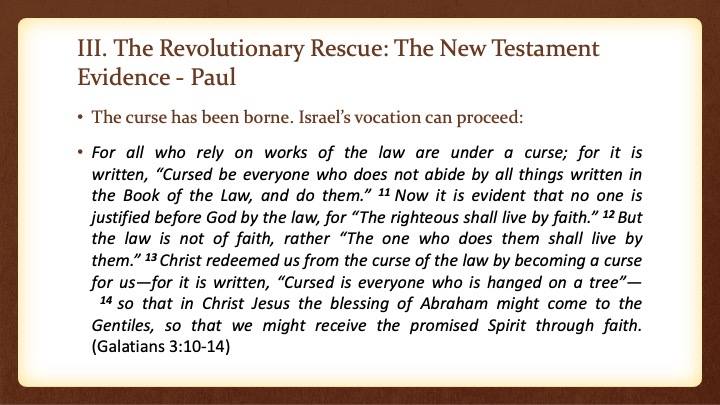
III. The Revolutionary Rescue: The New Testament Evidence – Paul
The curse has been borne. Israel’s vocation can proceed:
For all who rely on works of the law are under a curse; for it is written, “Cursed be everyone who does not abide by all things written in the Book of the Law, and do them.” 11 Now it is evident that no one is justified before God by the law, for “The righteous shall live by faith.” 12 But the law is not of faith, rather “The one who does them shall live by them.” 13 Christ redeemed us from the curse of the law by becoming a curse for us—for it is written, “Cursed is everyone who is hanged on a tree” - 14 so that in Christ Jesus the blessing of Abraham might come to the Gentiles, so that we might receive the promised Spirit through faith. (Galatians 3:10-14)
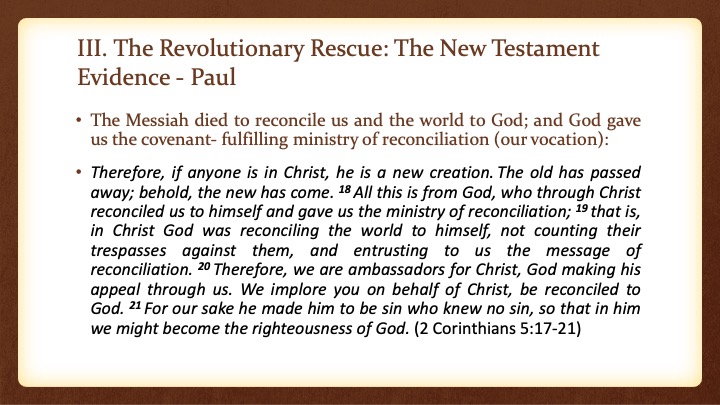
III. The Revolutionary Rescue: The New Testament Evidence – Paul
The Messiah died to reconcile us and the world to God; and God gave us the covenant- fulfilling ministry of reconciliation (our vocation): Therefore, if anyone is in Christ, he is a new creation. The old has passed away; behold, the new has come. 18 All this is from God, who through Christ reconciled us to himself and gave us the ministry of reconciliation; 19 that is, in Christ God was reconciling the world to himself, not counting their trespasses against them, and entrusting to us the message of reconciliation. 20 Therefore, we are ambassadors for Christ, God making his appeal through us. We implore you on behalf of Christ, be reconciled to God. 21 For our sake he made him to be sin who knew no sin, so that in him we might become the righteousness of God. (2 Corinthians 5:17-21)
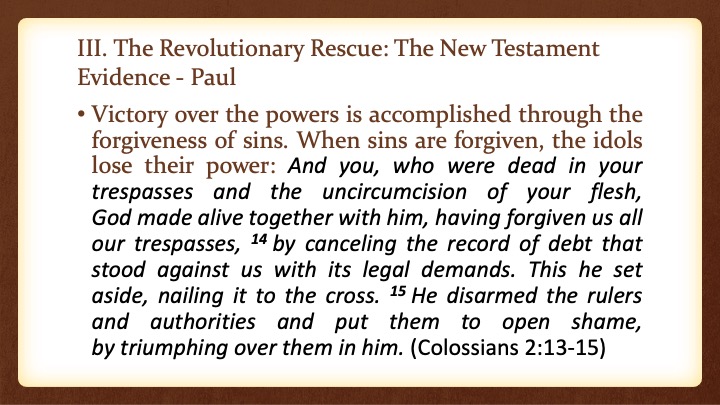
III. The Revolutionary Rescue: The New Testament Evidence – Paul
Victory over the powers is accomplished through the forgiveness of sins. When sins are forgiven, the idols lose their power: And you, who were dead in your trespasses and the uncircumcision of your flesh, God made alive together with him, having forgiven us all our trespasses, 14 by canceling the record of debt that stood against us with its legal demands. This he set aside, nailing it to the cross. 15 He disarmed the rulers and authorities and put them to open shame, by triumphing over them in him. (Colossians 2:13-15)
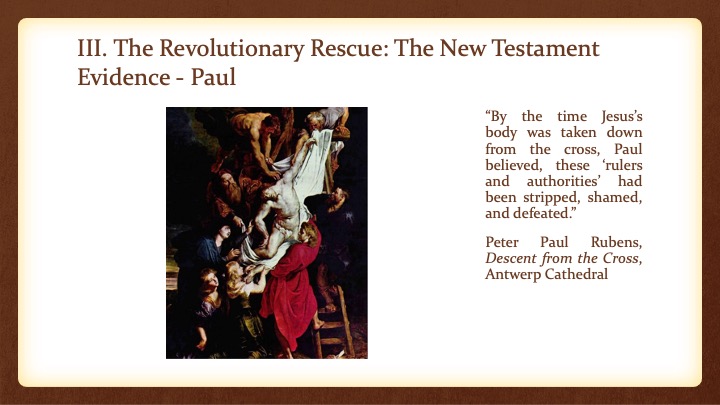
III. The Revolutionary Rescue: The New Testament Evidence – Paul
“By the time Jesus’s body was taken down from the cross, Paul believed, these ‘rulers and authorities’ had been stripped, shamed, and defeated.”
Peter Paul Rubens, Descent from the Cross, Antwerp Cathedral
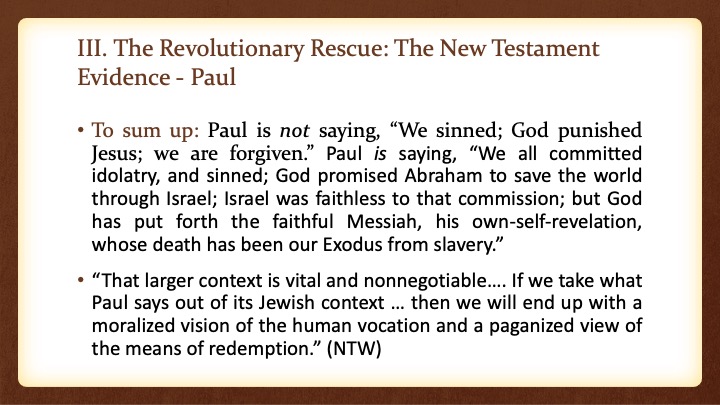
III. The Revolutionary Rescue: The New Testament Evidence – Paul
To sum up: Paul is not saying, “We sinned; God punished Jesus; we are forgiven.” Paul is saying, “We all committed idolatry, and sinned; God promised Abraham to save the world through Israel; Israel was faithless to that commission; but God has put forth the faithful Messiah, his own-self-revelation, whose death has been our Exodus from slavery.”
“That larger context is vital and nonnegotiable…. If we take what Paul says out of its Jewish context … then we will end up with a moralized vision of the human vocation and a paganized view of the means of redemption.” (NTW)
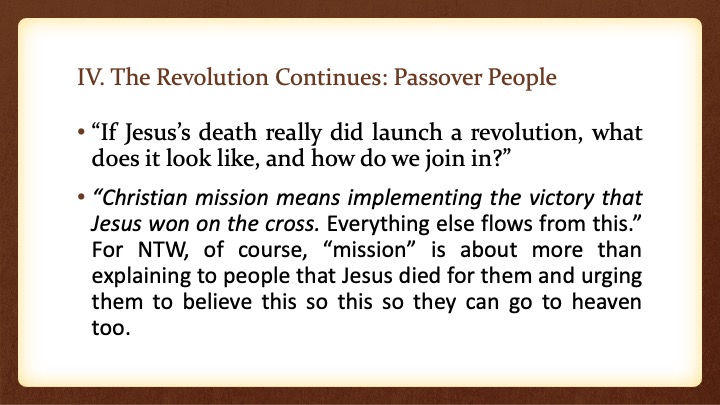
IV. The Revolution Continues: Passover People
If Jesus’s death really did launch a revolution, what does it look like, and how do we join in?”
“Christian mission means implementing the victory that Jesus won on the cross. Everything else flows from this.” For NTW, of course, “mission” is about more than explaining to people that Jesus died for them and urging them to believe this so this so they can go to heaven too.
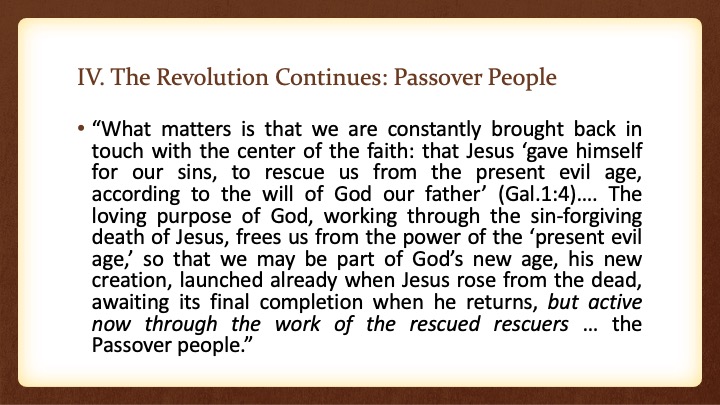
IV. The Revolution Continues: Passover People
“What matters is that we are constantly brought back in touch with the center of the faith: that Jesus ‘gave himself for our sins, to rescue us from the present evil age, according to the will of God our father’ (Gal.1:4)…. The loving purpose of God, working through the sin-forgiving death of Jesus, frees us from the power of the ‘present evil age,’ so that we may be part of God’s new age, his new creation, launched already when Jesus rose from the dead, awaiting its final completion when he returns, but active now through the work of the rescued rescuers … the Passover people.”
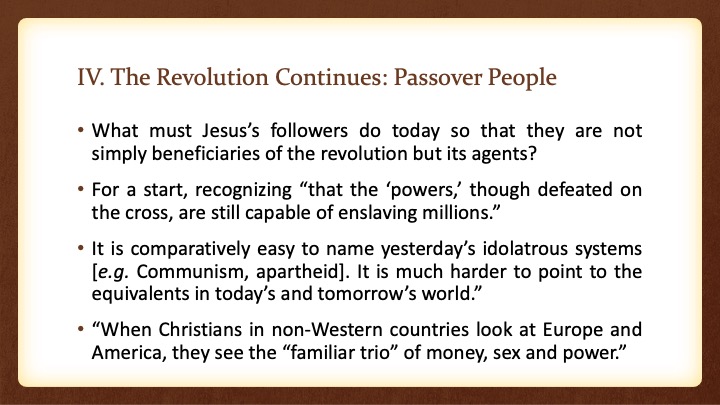
IV. The Revolution Continues: Passover People
What must Jesus’s followers do today so that they are not simply beneficiaries of the revolution but its agents?
For a start, recognizing “that the ‘powers,’ though defeated on the cross, are still capable of enslaving millions.”
It is comparatively easy to name yesterday’s idolatrous systems [e.g. Communism, apartheid]. It is much harder to point to the equivalents in today’s and tomorrow’s world.”
“When Christians in non-Western countries look at Europe and America, they see the “familiar trio” of money, sex and power.”
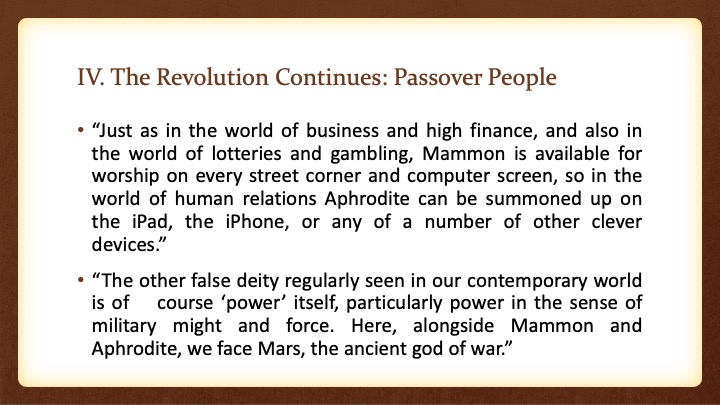
IV. The Revolution Continues: Passover People
“Just as in the world of business and high finance, and also in the world of lotteries and gambling, Mammon is available for worship on every street corner and computer screen, so in the world of human relations Aphrodite can be summoned up on the iPad, the iPhone, or any of a number of other clever devices.”
“The other false deity regularly seen in our contemporary world is of course ‘power’ itself, particularly power in the sense of military might and force. Here, alongside Mammon and Aphrodite, we face Mars, the ancient god of war.”
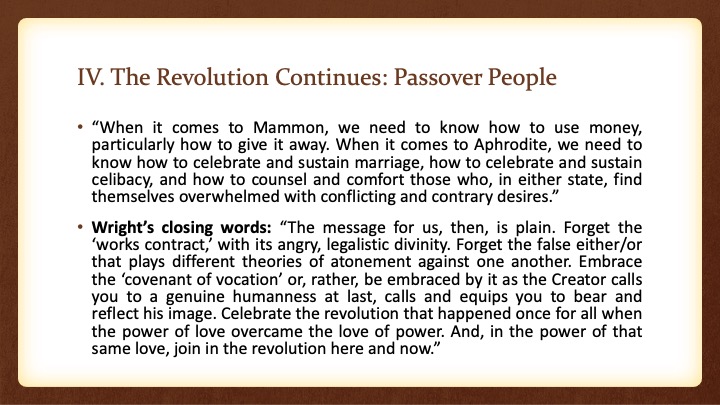
IV. The Revolution Continues: Passover People
“When it comes to Mammon, we need to know how to use money, particularly how to give it away. When it comes to Aphrodite, we need to know how to celebrate and sustain marriage, how to celebrate and sustain celibacy, and how to counsel and comfort those who, in either state, find themselves overwhelmed with conflicting and contrary desires.”
Wright’s closing words: “The message for us, then, is plain. Forget the ‘works contract,’ with its angry, legalistic divinity. Forget the false either/or that plays different theories of atonement against one another. Embrace the ‘covenant of vocation’ or, rather, be embraced by it as the Creator calls you to a genuine humanness at last, calls and equips you to bear and reflect his image. Celebrate the revolution that happened once for all when the power of love overcame the love of power. And, in the power of that same love, join in the revolution here and now.”